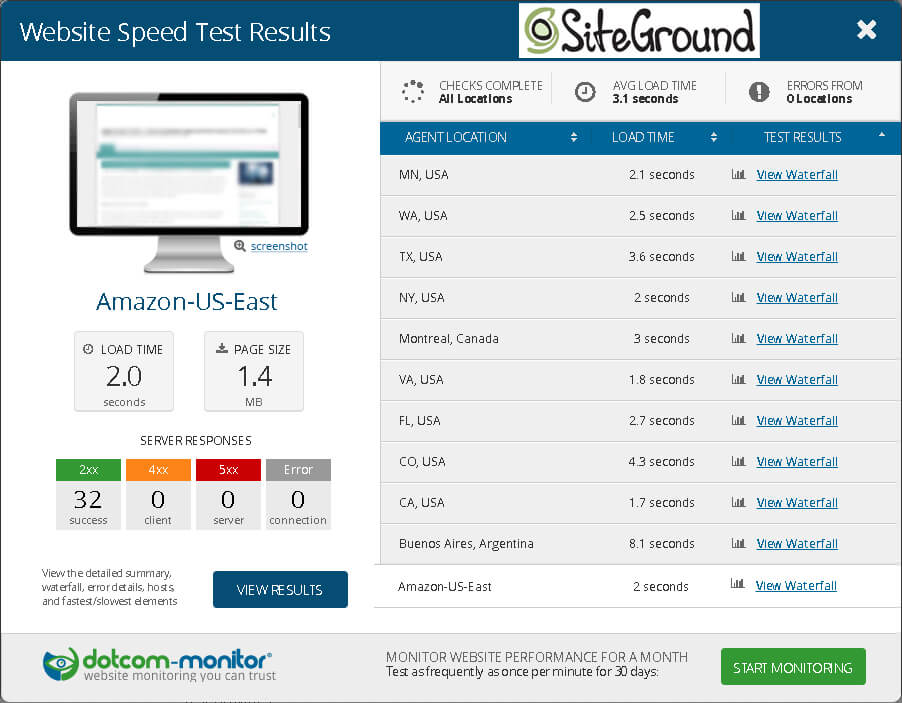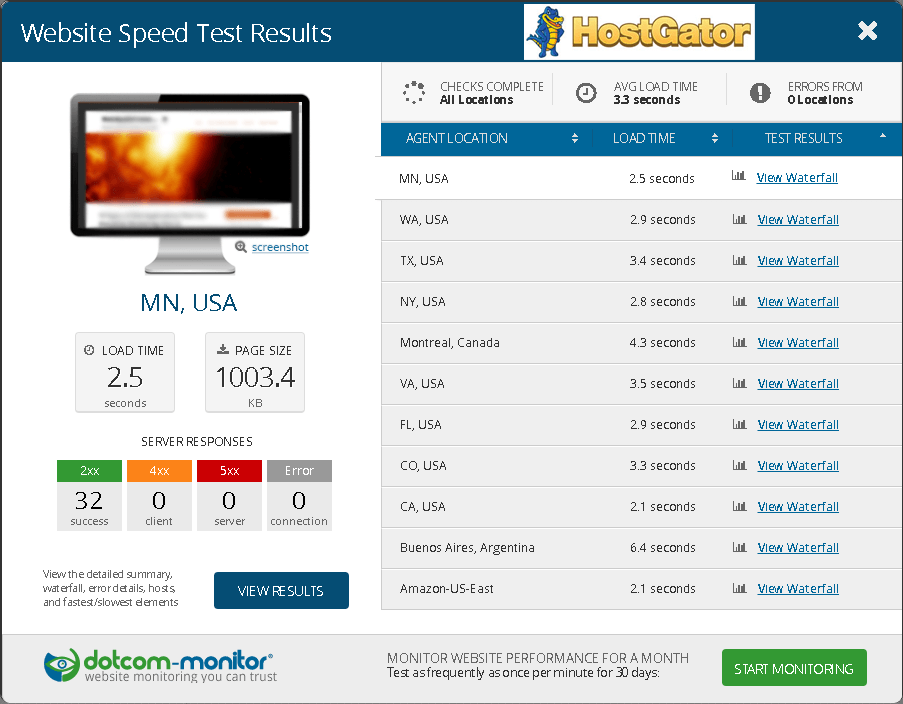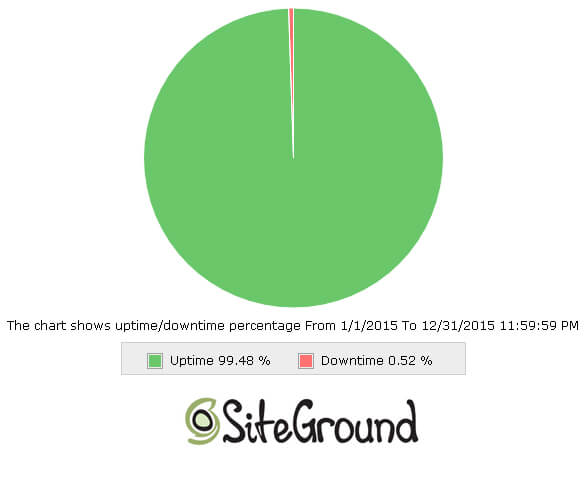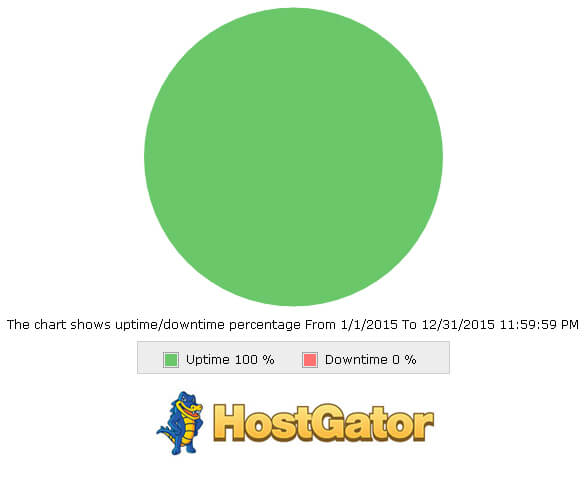Attempting to determine in between SiteGround and HostGator? Well, you have actually involved the best area! WebHostingBuddy was developed to supply sincere, extensive, and technological testimonials of webhosting business– not to thoughtlessly suggest poor quality hosts based upon associate payments!
SiteGroundand HostGatorare 2 of our all-time preferred firms, so we have a LOT of experience with each of them. HostGator was the initial business webhosting that we ever before bought, and SiteGround is just one of our best hosts when we intend to organize an essential WordPresswebsite on a budget plan. We actually like both business, so this is an enjoyable contrast.
Prior to we go any type of additionally, we simply intend to discuss that if you acquire organizing from several of the numerous services or firms on this web page, we may get a little associate payment. It does not cost you any kind of added to buy through our web links and assists “maintain the lights on,” with this website and likewise aids to maintain us giving cost-free web content and evaluations. We would certainly value it if you did acquisition by means of this web page, yet we additionally intended to see to it you understand that compensations do not affect our testimonials by any means. To confirm that and to aid maintain the website straightforward, we produced a web page called Hosts We Don’t Recommend. A few of these hosts (such as iPage) provide high associate compensations and we still do not suggest them. Eventually, we desire viewers to recognize that this is a sincere area to discover webhosting.
With several of the intro covered, allow’s leap right in to SiteGroundvs HostGatorand see which firm wins!
HostGator vs SiteGround: The Competition Categories
When assessing any type of webhosting, it’s essential to check out particular technological top qualities and various other elements of the host that assist to repaint a total image of their total proficiency and worth. There are a couple of classifications that we often tend to adhere to when reviewing any kind of host. These classifications are:
— Overall Performance & Speed– Reliability(Uptime Compared to Downtime)– How Good is the Support & Customer Service?– How
Easy is the System to Use?– Capabilities, Packages &
Pricing These classifications work as a great structure to review both unbiased and subjective information regarding HostGator and SiteGround. & In terms unbiased information,
you ‘ll discover a selection of efficiency
examination results readily available in each & area
on this web page, along with some even more subjective viewpoints that originate from our know-how in handling webhosting. To maintain points reasonable, we held one WordPress web site on HostGator and one more WordPress site on SiteGround. While these are various sites, they have basically the very same material size, exact same plugins, comparable WordPress motifs, and for screening functions are really comparable. In order to collect a large range of unbiased information, we checked the websites for 12 months utilizing Dotcom-Monitor’s tracking solutions, in addition to their one-off rate examinationsreadily available at Dotcom-Tools. com. With that said stated, allow’s progress and assess both hosts to see just how they gauge up in each classification. SiteGround versus HostGator: Overall Performance and Speed We’ll state this as soon as possible– SiteGround and HostGator are 2 of the fastest(not specialized WordPress like WP Engine )traditional hosts that we’ve ever before collaborated with and we truly have actually never ever been
also let down with either. Yet, simply our point of view does not state sufficient in this field, so we ran each of the examination sites with a total rate examination making use of Dotcom-Monitor’s complimentary devices internet site(Dotcom-Tools. com). The enjoyable aspect of Dotcom-Tools is that you aren’t restricted to a couple of information facilities– you can actually evaluate your site completely free from around the globe. In orderto maintain points succinct and basic, we restricted the rate examination to the American network (that includes 11 information facilities). The manner in which examination jobs resembles WebPageTest.org if you’ve ever before made use of that(other than they give even more information). Basically, Dotcom-Monitor’s web servers head out and take a full-page download of the web page of each examination website(one on SiteGround, and one on HostGator). Each component of the web page is timed and computed, along with the total web page rate. For this area, we’ll be concentrating on the total web page rate as it’s the easiest statistics to evaluate– nevertheless, often DNS or an additional issue is at mistake for a slow-loading website (that had not been the situation for either of these examinations). Considering the complying with screenshots, you can see the outcomes of the rate examination summed up for both examination websites.

Above, you’ll see a screenshot of the SiteGround speed test using Dotcom-Monitor, and below you can see the results of the HostGator speed test using Dotcom-Monitor. While the results are somewhat similar for certain locations, they vary quite a bit for others.

As we mentioned before, both of these hosts are quite speedy, and that’s evident in the test results. The best time that HostGator put on the board was 2.1 seconds, with an overall average of 3.3 seconds. The best time that SiteGround put on the board was 1.7 seconds (in multiple datacenters) with an average of 3.1 seconds overall, just edging out HostGator in the speed area. The goal for most websites is to have all pages load in under 3 seconds, and both hosts are right on the mark here.
In our opinion, HostGator is an excellent host in terms of speed, and they’re very speedy for a lower-priced host, but SiteGround was just a little bit faster here.
So, in the category of overall performance and speed, SiteGround is the winner.

And again—keep in mind that HostGator is still a quick host and a very good choice if you’re conscious of speed, it’s just that SiteGround does a little bit better job, and we think this is due to some of their caching technology as well as the fact that they manage their servers extremely well.
Reliability (Uptime Compared to Downtime) – HostGator and SiteGround
When shopping for a web host, most people understand that reliability is one of the most important features, hand-in-hand with speed and performance. Simply put, if your website isn’t inaccessible, it’s of no use to you or your visitors. Having a website that goes down at an inopportune time can be incredibly embarrassing for both businesses and individuals, especially if a lot has been done to promote the site recently and the news of it being down is spreading like wild fire through social media; this isn’t a situation anyone wants to be in.

Fortunately, most mainstream web hosts have pretty good uptime guarantees, but this doesn’t mean that they’re all created equally. In our experience, both HostGator and SiteGround have had great uptime for us on a personal and professional level. That said, we still wanted to put them to the test in order to get some objective data and numbers.
To do that, we used Dotcom-Monitor’s system in order to ping each website at 3 hour intervals for 12 months straight. Each site was pinged and checked for any uptime/downtime problems 24 hours a day, 7 days a week. Because this test ran for 12 months, it really gives a good picture of the reliability of each web host. With that said, let’s take a look at the numbers.
SiteGround had a 99.48% uptime rating over 12 months, which meant that the site was only down 0.52% of the over the entire year. While that might not sound like much (and it really isn’t), let’s put that into perspective. There are approximately 525,600 minutes in an entire year, so 0.52% of 525,600 = 2733 minutes, or about 45 hours over the year, or approximately 2 days. So the SiteGround test site was down for about a total of 2 days out of 365 days—not bad. And of course, that downtime most likely didn’t occur all at once.

The HostGator site had a rating of 100% uptime over 12 months, which is quite remarkable. This doesn’t mean that there was no downtime, it just means that it wasn’t detected because it didn’t occur at the 3 hour intervals. With 100% uptime, there are no downtime calculations to do. The default industry standard for SLA uptime performance is 99.9% so while SiteGround had a great rating, there were a tiny bit short of that—but not much. HostGator had a perfect score and exceeded even the industry standard.
With that being said, HostGator is the obvious winner in the category of reliability.
However, we really like SiteGround and would never classify them as an “unreliable” host by any means, so while HostGator was really perfect in this category, SiteGround is still very good. In fact, they’re currently (at the time of writing of this comparison) our favorite host to use with WordPress when we’re not using a premium host like WP Engine. They have been super reliable for us and while we’re not currently monitoring uptime on sites we have hosted with them, we haven’t noticed any downtime or dips in traffic, and some of the sites we’re hosting with them get a fair amount of traffic. So, just because they had a little downtime over 12 months doesn’t make them an unreliable host at all, they’re actually great.

Support and Customer Service—SiteGround Compared to HostGator
Support is something that can make or break a host—they can be fast, reliable, cheap, and whatever else, but if their support sucks it’s a real reason to consider a different host. The truth is that when there’s a problem with your website or web server, you really need answers fast and you can’t wait hours or even days with some of the worst hosts. Fortunately, SiteGround and HostGator both have good support, so let’s take a look at how they measure up.

Obviously this category is fairly subjective based upon our experience and the experience of our colleagues, but collectively that’s a lot of expertise. Each host has 24/7/365 chat, email, ticket, and telephone support—and that’s the way it should be. Due to the on-demand nature of the internet and websites, support should always be accessible from a good host and in many different ways (chat, email, phone, etc.).
Our experience with SiteGround support has been phenomenal. They are based overseas (somewhere in Eastern Europe it appears) but it doesn’t have any effect on the quality of their support—it’s awesome in all ways. Their first level techs know a ton, and if you have a problem that requires a more in-depth look, they will usually open a ticket and have someone start working on your problem, and this usually happens very quickly. Really, SiteGround has some of the best support of any host out there right now in our opinion.
HostGator’s support isn’t bad, but it really doesn’t compare all that well with SiteGround’s support at the moment. As we’ve mentioned on other pages, we believe that HostGator’s support used to be better but it’s really taken a dive in the last year or so (prior to the time of writing) in our opinion. HostGator’s biggest problem in the last year or so has been the increase in wait times. It was so bad at one point that they took over a week to respond to a ticket we had open and then issued us a one month credit because of the delay. While we appreciated the credit, that type of delay is unacceptable in the world of hosting, especially for a good host like HostGator.
Due to the delayed response times of HostGator lately, we believe that SiteGround really wins this category and it’s not just a small win…they win big here.

Click here to visit SiteGround
Hopefully in the future this is something that HostGator can fix since their technical support was every bit as good as SiteGround’s, at least from our perspective.
Which Host More User-Friendly? SiteGround or HostGator?
Some hosts have extremely confusing back-end panels (DreamHost), while others are easy-to-navigate and make a lot of sense. The most common back-end panel is cPanel, which we would call the industry standard, although there are some hosts that use Plesk and other similar panels. cPanel is very user-friendly and this is what both HostGator and SiteGround use.

When it comes to cPanel, there really aren’t any surprises and even a web hosting novice can figure it out without too much trouble (which is why so many hosts use it). Both HostGator and SiteGround put their own custom configuration on top of cPanel and they both do a good job with that. Each host adds some of their own features (like SiteGround’s caching feature) which is also fairly intuitive. Really in terms of the backend, there aren’t any surprises from either host and they both do a great job laying out the user interface.
Typically hosts have a separate billing/support interface that’s not part of the server backend, and again—both HostGator and SiteGround do a good job of making these easy-to-use, intuitive, and user-friendly.
In the area of UI/UX/ease-of-use, they both do an equally great job, so this area is a tie between both hosts.
Really, if you’re looking for a simple, clean, easy-to-use backend and support/billing portal, you can’t go wrong with either HostGator or SiteGround.
Capabilities, Packages & Pricing: HostGator & SiteGround
Pricing and features are always a consideration when choosing a host, and when it comes to web hosting, it is mostly true that you basically get what you pay for. As mentioned on other pages of this site, pricing is also one of the most confusing aspects of choosing as web host because it’s a common practice among web hosts to offer a low introductory rate and then raise the rates significantly upon renewal. Other services that operate this way are cable and satellite TV, and a variety of other subscription services.

With that said, both HostGator and SiteGround have fairly straightforward pricing and features. SiteGround has three main plans—“StartUp,” “GrowBig,” and “GoGeek.” Each of these has additional features as you move up to the next level such as premium support, free ecommerce tools, and more. If you’re a new customer, the plans are $6.99/month, $9.99/month, and $14.99/month. While SiteGround doesn’t specifically meter traffic, they do set a “visit count” on the number of unique visitors that each plan should be able to sustain in a given month. This is similar to the way that managed WordPress hosts meter their traffic, but SiteGround is actually more of a hybrid host in all honesty. Each plan includes 10GB/20GB/30GB of space, and again—more premium features are added as you move up in from one level to the next.
HostGator also has a few different pricing tiers with their “Hatchling” plan being the cheapest at $3.45/month. They next plan up is $4.95/month, and their top tier shared plan is $5.95/month. One thing HostGator does that SiteGround doesn’t is they offer “unlimited” everything so-to-speak. Bandwidth, storage, etc.—but most people know that there’s really no such thing as “unlimited” and if you abuse the services they can and will cap your usage.
SiteGround’s plans do seem to offer more premium features than HostGator’s, but HostGator does seem to do a little better on pricing. SiteGround doesn’t allow you to pay monthly on most of their plans and although HostGator does, you’ll pay a lot more for that option. With each host, the longer term you pay for the better deal you’ll get. In order to get HostGator’s cheapest pricing, you need to pay for 3 years in advance, which is a very long time.
Who takes the cake in terms of pricing? It’s another tie!
While SiteGround offers more premium features, they also have a more premium price. HostGator is a bit cheaper if you go for a longer term, but they don’t have all of the features that SiteGround does, so it’s really a wash—you can’t go wrong with either package or host.
